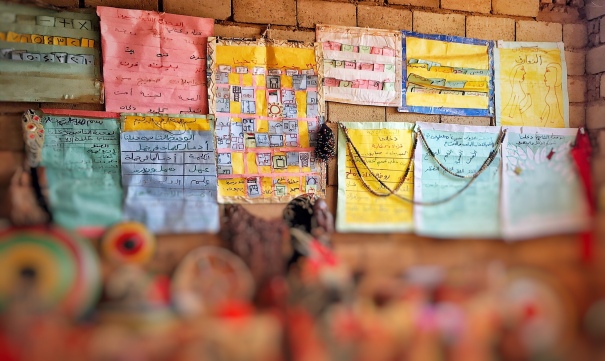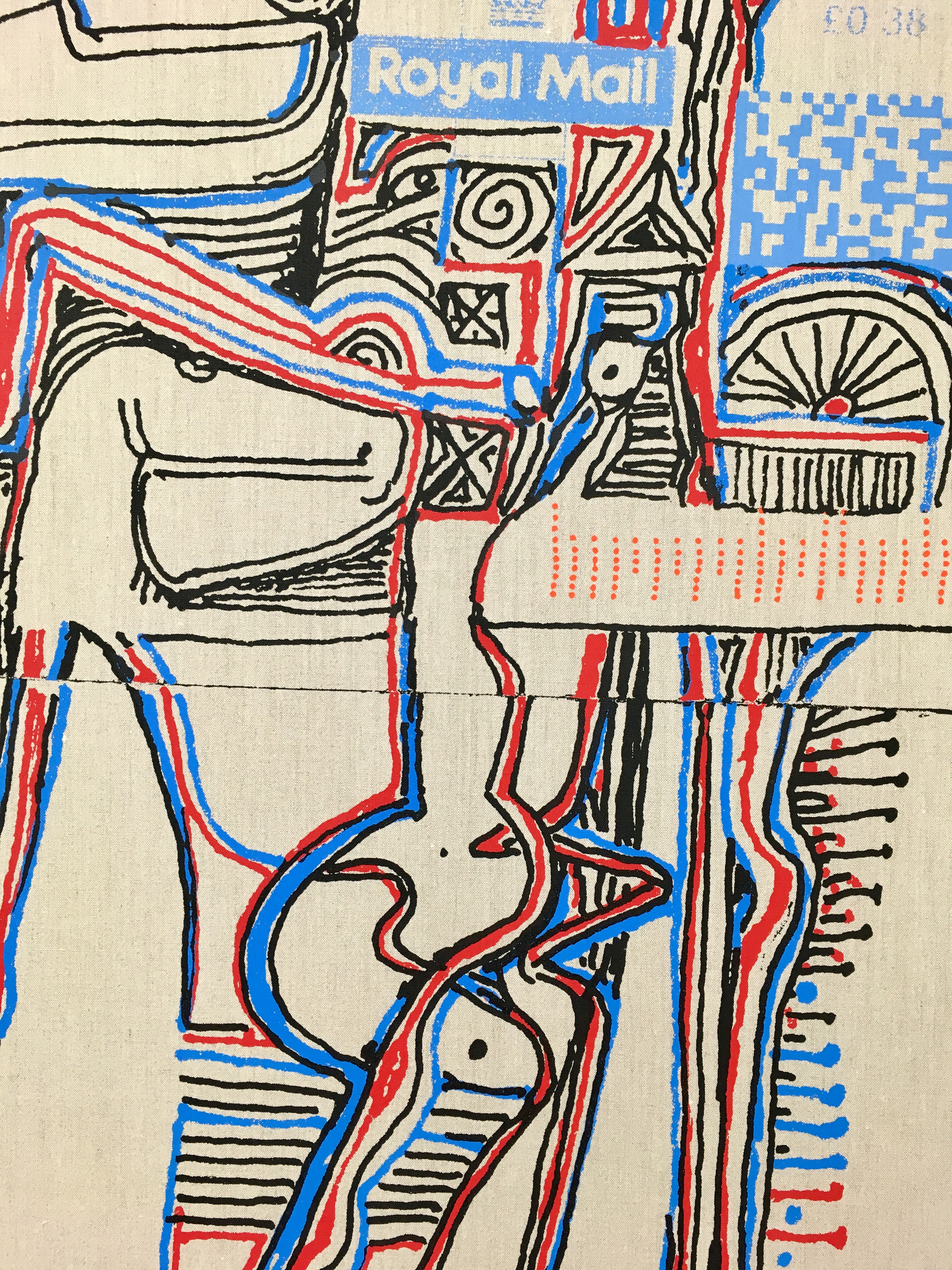

Interested in learning more about our work? Visit Women’s Education Partnership
All photographs of WEP’s literacy work in this blog are copyright Imogen Thurbon and may not be reproduced without written permission
In a small outhouse attached to a communal mosque on the very edge of Khartoum’s sprawling metropolis a women’s literacy circle meets twice a week. A bare rectangle of mud and corrugated iron traced on baked earth, the outhouse lies among the ramshackle settlements of mud brick homes that huddle low under a late afternoon sky blanched white with heat. Its existence defies all the odds and yet is typical of all the literacy circles I have seen.
You leave your shoes at the door and step into the dappled gloom of a room crowded with women of all ages. Some can be no more than in their late teens and they look up from the infant in their arms or the notebook on their laps to smile at you in greeting. Other much older women nod and smile too in your direction though it is clear from the milky haze in their eyes that they are suffering from advanced cataracts. For just a couple of hours, all these women have set aside the rest of their lives – the pressing demands on their time, energies and meager resources – to be here. Eager to acquire the urban literacies that will enable them and their families to flourish in the city, they bring to the circle the rural literacies and skills of their homelands in Nuba Mountains and Darfur. These women clearly believe or at least want to believe that literacy works.

Journeys to Literacy – the Long Road to Learning
The women attending this and all the other literacy circles I have seen have been robbed of their right to education by poverty, family tragedy, regional upheaval, and in some cases ethnic and economic conflict. One woman told me she had never gone to school because her parents had only had enough money to educate one child and so her elder brother had been chosen for schooling. Another had been orphaned as a young girl and had taken on the responsibility of caring for her family alone.

Using handicraft skills to develop literacy, numeracy and small income generating projects.
Many come from regions increasingly affected by climate change which brings in its wake the loss of productive agricultural land, diminishing water supplies and forced migration to urban areas. Others have never had the chance to go to school because their home villages were geographically isolated and so had been overlooked by central government when it came to investment in educational resources. Others still have been forced into an early marriage or are simply of an age that meant they had never had the opportunity to study when they were young. It is interesting to note that Sudanese women over the age of 65 appear to be by far the most vulnerable to lack of educational opportunities, with some estimates putting the rate of illiteracy among this group as high as 90%.

Visiting our literacy participants at Jebel Awlia
That these women feel it is worth attending literacy circles is remarkable given the life challenges they have faced. But it is also remarkable for another reason. Literacy work may have become more participative and moved away from the 1960’s primers whose mummified remains can still be bought on the pavement book stalls of Qasr Street in Khartoum with their line drawings and simple cliched texts to be chorused but it is still widely suspected of being deadly dull. Yet what I saw during the circles I attended was anything but pedestrian.

Interested in supporting our work? Visit Women’s Education Partnership
Please consider giving to our life-changing work. Just click on the link below to donate quickly and securely:
Journeys to Literacy – Women tell their Stories
Why do women seek out literacy when so much is stacked against them? In one circle a participant explained what had motivated her to attend her local literacy group and the sense of empowerment and confidence it had given her:
“I had to go to the health clinic but because I couldn’t read the signs, I had to keep asking people for help in finding it. At last I reached what I thought was the clinic and asked the man standing nearby if I was right. He turned to me and said ‘what’s the point of you looking for a clinic when you can’t even read? You should stay at home!’ At first I felt terrible but then I got angry – angry that he thought he could insult me in that way. So I joined our literacy circle. Now I feel proud that I can read. No one will insult me again.”
Another participant told me: “We women were all sitting inside the lorry while the men, as is our custom, sat on the roof. Night was falling and we were anxious to arrive so we called up to our brothers and husbands asking where we were. They kept saying ‘not yet, not yet. There’s still a long way to go. I knew that we had to be getting close by now so I stood up and looked out. Pointing to the road sign that I could read perfectly, I shouted up to them: ‘you need to turn left her look at the sign! We’re almost there.’ They were astonished and asked me how I knew so I told them about our literacy circle. From then on, they encouraged their wives to go too.”

Learning basic spelling through games and competitions.
Generating Community Change through Literacy
Central to REFLECT is its understanding of literacy acquisition as a driver of community engagement and in every circle I visited some form of community action was being explored, debated, mapped out or organized. See Community Literacy and REFLECT. One circle I attended were discussing community action they could undertake to prevent malaria and bilharzia outbreaks by clearing stagnant water ditches and visiting neighbours to explain simple prevention strategies. In another circle, I was told the women had requested a visiting public health official to talk about the prevention of watery diarrhoea and he did so using drama and role plays. Another circle were mapping out on large sheets of card how household income and expenditure varied from month to month and season to season and discussing how to supplement household income through the handicraft skills they had brought with them from their rural homelands in Darfur and the Nuba Mountains. Others had requested training in food processing skills and had attended a course offered on this by a local employer.

Jebel Aulia literacy circle – discussing disease prevention campaigns.
Some of the circles I attended were tackling sensitive issues of ethnic, economic and family conflict as well as exploring attitudes towards and the personal challenges they faced relating to gender-based violence and coercion, polygamy and inheritance disputes. Often these issues were explored through debate, songs and role plays and the role play I witnessed of the family tensions generated when a husband chose to take a second wife explored heartfelt personal and social dilemmas both movingly and informatively.
The Context – Literacy in Sudan
The literacy circles I had the privilege to attend certainly seemed at very least to give cause for optimism that participative literacy work paid dividends in terms of women’s personal literacy goals and community engagement and change. And the need for optimism is great in Sudan, given the grim statistics surrounding literacy there and despite the committed work of the National Council for Literacy and Education, aimed at eradicating illiteracy in Sudan.
The NCLAE has launched mass literacy campaigns focusing on the young and there has at least been considerable improvement in literacy rates since the 1990’s when it has been estimated that less than 20% of women in Northern Sudan were literate. As in many developing countries, Sudan has focused on eradicating illiteracy by seeking to improve primary school uptake. World Bank website documents state that primary school enrollment in Sudan represents 46% of eligible pupils while secondary school enrollment stands at 21% of eligible students, with substantial variation by province and region.

Learning resources made by our participants cover the walls.
The problem with this approach is that it fails to acknowledge the role of adult literacy in children’s education and the independent right of adults to literacy. Adult literacy has overwhelmingly been treated as the poor sister in national education development programs and indeed Sudan is no different in this respect in that most adult literacy projects are left to small scale NGO organizations, often operating under severe financial and regulatory constraints. The non-governmental literacy providers in general favour more participative and community based approaches to literacy training, rather than the more traditional and often volunteer-based training given in state-funded mass literacy campaigns.

Helena Collander’s recording of Sudan’s literacy data.

Interested in supporting our work? Visit Women’s Education Partnership
Please consider giving to our life-changing work. Just click on the link below to donate quickly and securely:
Journeying Together
The inspiring work of Sudanese community literacy experts such as Dr Leila Bashir and Mrs Adila Abdel Rahman and the literacy programs they direct seek to weave together the many strands of Sudan’s complex literacy scene and forge coherent, longterm adult literacy programs that serve both the individual and her community.
This article is an abridged version of Challenges to Literacy and the Role of Women’s Community Literacy Networks in Sudan, Imogen Thurbon, first published in SudanStudies for South Sudan and Sudan, March 2018, Number 57. Read full article here: SS57_Thurbon


Community Literacy and REFLECT The Power of Folktales Training the Trainer Literacy and Development Links Voices


